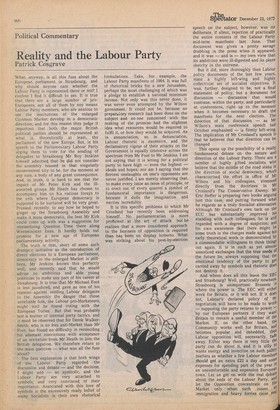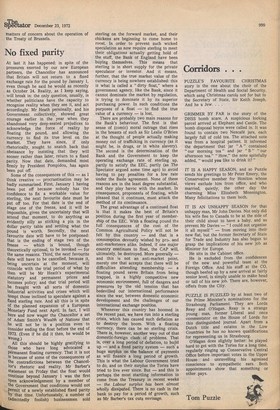Political Commentary
Reality and the Labour Party
Patrick Cosgrave
What, anyway, is all this fuss about the European parliament in Strasbourg, and why should anyone care whether the Labour Party is represented there or not? I confess I find it difficult to see. It is true that there are a large number of proEuropeans, not all of them by any means Labour Party members, who are anxious to see the institutions of the enlarged Common Market develop in a democratic direction; and for this reason they judge it important that both the major British political parties should be represented at what is, theoretically at least, the parliament of the new Europe. But, in his speech to the Parliamentary Labour Party urging them to vote for the sending of delegates to Strasbourg Mr Roy Jenkins himself admitted that he did not consider the assembly housed in that singularly inconvenient city to be, for the moment at any rate, a body of any great consequence. And, in truth, it is hard to see that the impact of Mr Peter Kirk and the illassorted groups Mr Heath has chosen to accompany him on his various forays to the crib where European democracy is supposed to be nurtured will be very great. Pressed, recently, to say how he hoped to ginger up the Strasbourg Assembly and make it more democratic, the best Mr Kirk could come up with was a suggestion for streamlining Question Time there along Westminister lines. It hardly holds out promise for a new age of European parliamentary activity.
The truth is that, short of some such dramatic initiative as the introduction of direct elections to a European parliament, democracy in the enlarged Market is stillborn. Mr Jenkins knows this perfectly well, and recently said that he would advise no ambitious and able young politician to make any part of his career at Strasbourg. It is true that Mr Michael Foot is less jaundiced, and gave as one of his reasons against sending Labour delegates to the Assembly the danger that those unreliable folk, the Labour pro-Marketeers, might well be found voting with the European Tories. But that was probably just a matter of internal party tactics, and it must be observed that Sir Derek WalkerSmith, who is no less anti-Market than Mr Foot, has found no difficulty in reconciling his adamant convictions with acceptance of an invitation from Mr Heath to join the British delegation. We therefore return to the main question — what was all the fuss about?
The best explanation is that both wings of the Labour Party regarded the discussion and debate — and the decision, I might add — as symbolic, and the Labour Party are very attached to symbols, and very convinced of their importance. Associated with this love of symbols is the excessively ready belief of many Socialists in their own rhetorical formulations. Take, for example, the Labour Party manifesto of 1964. It was full of rhetorical bricks for a new Jerusalem, perhaps the most challenging of which was a pledge to establish a national minimum income. Not only was this never done, it was never even attempted by the Wilson govenment. It could not be, because no prepart4Zory research had been done on the subject and no one concerned with the making of the promise had the slightest idea what resources would be required to fulfil it, or how they would be acquired. As in annunciation, so in denunciation, Labour rhetoric is excessive, and the declamatory vigour of their attacks on the Government is equally intensive across the spectrum from Mr Foot to Mr Jenkins. I am not saying that it is wrong for a political party to have high — even the highest — ideals and hopes; nor am I saying that the fiercest onslaughts on one's opponents are never justified. I am merely observing that, to make every issue an issue of principle, or to erect out of every quarrel a symbol of fundamental importance is dangerous, because it dulls the imagination and excites incredulity.
It is this specific problems to which Mr Crosland has recently been addressing himself. No parliamentarian is more proficient at the art of attack but he realises that a more considered approach to the business of opposition is required than has been on display hitherto. What was striking about his post-by-election speech on the subject, however, was its deliberate, if silent, rejection of practically the entire contents of the Labour Party mid-term manifesto last June. That document was given a pretty savage drubbing in the press when it appeared; and it was — and is — my own view that its ambitions were ill-digested and its plans sketchy in the extreme.
But it did, more thoroughly than Labour policy documents of the last few years, state a highly left-wing and highly collectivist set of socialist objectives. It was, further, designed to be, not a final statement of policy, but a document for discussion — discussion that would continue, within the party, and particularly at conferences, right up to the moment when it becomes necessary to draft the manifesto for the next election. The direction of that discussion — as Mr Wilson's main conference speech last October emphasised — is firmly left-wing. The implication of Mr Crosland's speech is that he believes that that direction can be changed
This opens up the possibility of a reallY fundamental debate on the nature and direction of the Labour Party. There are a number of highly gifted socialists who believe that the middle of the road stabs in the direction of social democracy, which characterised the effort in office of Mr Wilson and his colleagues, stemmed directly from the doctrines in Mr Crosland's The Conservative Enemy. Mr Eric Heifer is preparing two books arguing just this case, and putting forward what he regards as a truly Socialist alternative. Although Mr Crosland's own tack on the ECC has substantially improved his standing with such colleagues, he is still regarded, with a degree of suspicion; and his own awareness that there might be some truth in the charges made against his early theoretical work is demonstrated bY a commendable willingness to think things out again. It is in such as yet almost unnoticed exchanges that the true seeds of the future lie, always supposing that the emotional tendency of the party to get carried away by symbols and rhetoric does not destroy. it. And where does all this leave the EEC and Strasbourg? Well, practically nowhere. Strasbourg is unimportant: Brussels is where the power is. The EEC will either work for Britain, or it will not. If it does not, Labour's declared policy of renegotiation will have to be made to wall( — supposing the party returns to power by our European partners if they want Britain to remain a useful member of the Market. If, on the other hand, the Community works well for Britain, 'and becomes popular and imbedded, thee Labour opposition will, necessarily, fade away. Either way there is very little the party can do about it, and it is silly t° waste energy and invective on such paltrY matters as whether a few Labour memberS should get an extra £22 a day and SOPO expenses for spending part of the year ill an uncomfortable and expensive European town. Let us get on with the real debate, about the ends of the Labour Party, an' let the Opposition concentrate on the Market only when such issues es, immigration and heavy lorries raise tee'
matters of concern about the operation of the Treaty of Brussels.











































 Previous page
Previous page